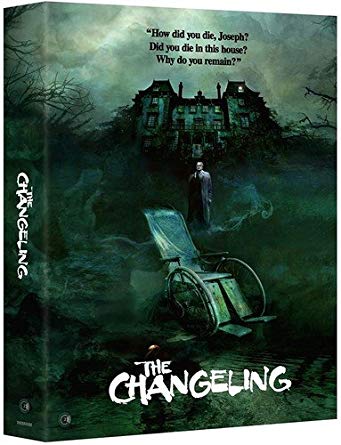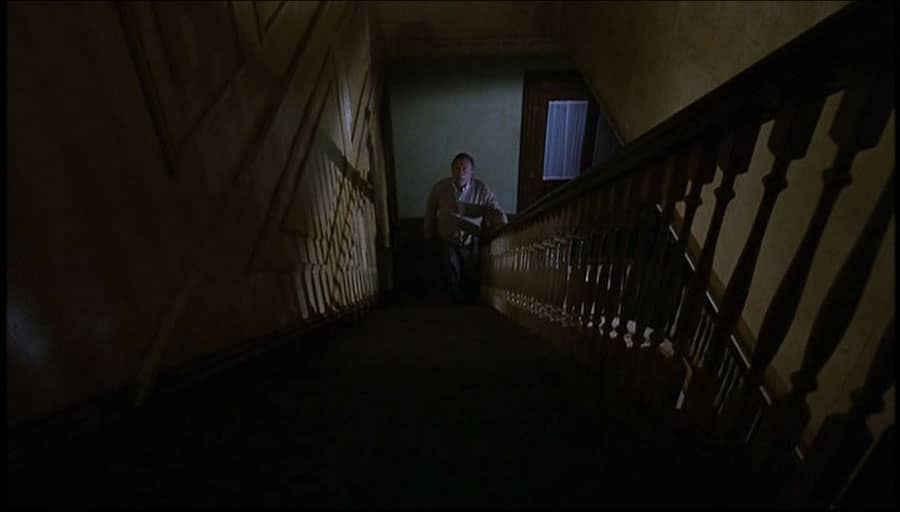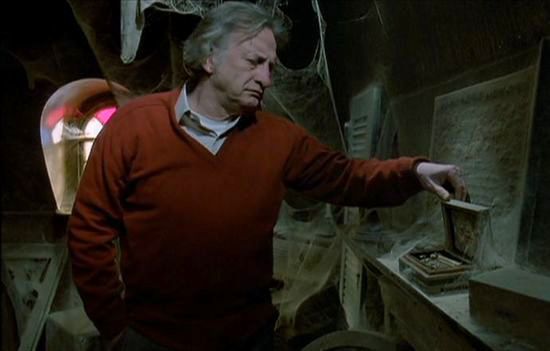It’s a pleasure to find oneself watching a hitherto-unknown supernatural horror, just like The Changeling. Before Insidious and that Woman in Black remake were even a twinkle in the eye, before ghosts got riotous, filmmakers were giving voice to ghost stories which could be understated, yet complex enough to keep their secrets until the end.
 Winter, upstate New York. The Russell family are on vacation, but their vehicle has broken down in the snow. As father John (George C. Scott) crosses the road to call for help, an out-of-control truck careers towards his wife and daughter. A simple and effective cut to John, alone and back in the city, tells the audience all it needs to know; it’s the first understated moment of the film which shows that director Peter Medak trusts us to understand what’s going on without spelling everything out for us. The family home is now boxed up, with only flashbacks to show us what it once was.
Winter, upstate New York. The Russell family are on vacation, but their vehicle has broken down in the snow. As father John (George C. Scott) crosses the road to call for help, an out-of-control truck careers towards his wife and daughter. A simple and effective cut to John, alone and back in the city, tells the audience all it needs to know; it’s the first understated moment of the film which shows that director Peter Medak trusts us to understand what’s going on without spelling everything out for us. The family home is now boxed up, with only flashbacks to show us what it once was.
Russell is therefore relocating, hoping to continue his work as a composer in a place less imbued with painful memories. He decides to rent an imposing old house, which he gets at a very reasonable rent from an acquaintance, Claire, who works for the historical society which has power to grant his new tenancy. At first, he’s able to recommence his work. But slowly, subtly, the house begins to change. Strange noises occur; certain phenomena leave John wondering if his grief or overwork is to blame. However, his curiosity piqued, he begins to explore further in the by-now profoundly unwelcoming space. As he pieces together evidence of what the house, or something in it, seems to want him to know, certain coincidences seem to point to Russell having something in common with this place – though perhaps not in the sense I imagined. Somehow, he’s primed to be the one to make disturbing discoveries about his new home. With Claire’s help, they uncover evidence of horrifying events in the house’s past – and further evidence that someone very much alive is trying to stop them making further revelations.
Many of the best haunted house films were made in the 60s and 70s, I would argue; whilst The Changeling was made at the very tail end of that time period, it shares many positive features with some of the best of these, even though for whatever reason The Changeling isn’t as well-known as, say, The Legend of Hell House. To be fair, some of the features we see in the former have been adapted and included in so many horror films, that they edge towards cliche; for example, the microfiche search is a ubiquitous thing, and has been very slow to get swapped for Google even in newer films. The rent-a-psychic is also a key component in supernatural terrors, still with us to the present day. But, sadly, a lot of the stylistic decisions in which 60s and 70s supernatural cinema is so rich have been swapped for jump scares and physical jerks in modern cinema. The Changeling doesn’t use a single jump scare, and is all the more atmospheric and well-crafted for it.
 Everything is handled with a sensitive pace, allowing characterisation to blossom without having Russell say everything he’s thinking; slowly and surely, he picks his way through a story which effectively leads him/us down a few blind alleys, arriving at its surprising denouement cautiously. I’d also argue that in the best supernatural horrors, the haunted place – usually a house – seems to operate as a character in its own right. Before we can safely attribute phenomena to a specific entity, we can only interpret the strangeness of the haunted place itself. It is the source of the phenomena, so it needs to seem almost sentient, as well as striking in aesthetics and atmosphere. The house in The Changeling has all of this in abundance, too. Camera angles are shot from the house’s perspective, and it’s described by Russell himself as having wants and preferences. Again, it’s simple stuff I suppose, but done well it’s very effective. The film does more, too, by linking its supernatural to real-life events, which calls up far older ideas that ‘justice will out’ to a very modern tale of corruption.
Everything is handled with a sensitive pace, allowing characterisation to blossom without having Russell say everything he’s thinking; slowly and surely, he picks his way through a story which effectively leads him/us down a few blind alleys, arriving at its surprising denouement cautiously. I’d also argue that in the best supernatural horrors, the haunted place – usually a house – seems to operate as a character in its own right. Before we can safely attribute phenomena to a specific entity, we can only interpret the strangeness of the haunted place itself. It is the source of the phenomena, so it needs to seem almost sentient, as well as striking in aesthetics and atmosphere. The house in The Changeling has all of this in abundance, too. Camera angles are shot from the house’s perspective, and it’s described by Russell himself as having wants and preferences. Again, it’s simple stuff I suppose, but done well it’s very effective. The film does more, too, by linking its supernatural to real-life events, which calls up far older ideas that ‘justice will out’ to a very modern tale of corruption.
This is one of those pesky reviews where I’d love to go into more details about how the story unfolds, and I know that for many people, this is already an old favourite. However, I can’t help but think that this might be an unknown quantity for quite a few others; the fact that I don’t want to spoil it is testament to the film’s quality. This is a muted, but well-developed story which rewards the interest, with old horrors reaching into the contemporary time-frame of the film, but simultaneously, given its forty-year age, appearing like something of a lost gem. The Changeling is very much of its time and type, so for fans of this genre it comes highly recommended. It also achieves several of those skin-crawling creepy moments which we chase through countless horror films; subtlety is the most fruitful approach, and it pays dividends here.
The Changeling is available on Blu-ray now via Second Sight.
